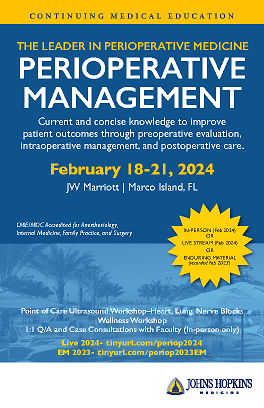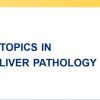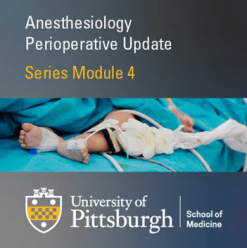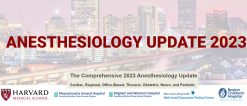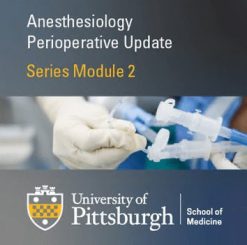Johns Hopkins Perioperative Management-In Its 39th Year 2024
$80,00
This Product is shared via google drive download link, So please share your correct Gmail id while placing the order .Please note that there are no CME points or certificate associated with this course Samples for Courses Can be found here : Free Samples Here!
Include: 4 videos + 50 pdfs, size: 21.4 GB
Johns Hopkins Perioperative Management-In Its 39th Year 2024
Include: 4 videos + 50 pdfs, size: 21.4 GB
Target Audience: Anesthesiology, Critical Care Medicine, General Surgery, Hospitalist, Internal Medicine Physician
Information:
Sunday, February 18, 2024, 7:00 AM – Wednesday, February 21, 2024, 2:00 PM, Marco Island Marriott, Marco Island, FL
Over 300 million patients undergo surgical procedures worldwide, and the age and medical complexity of this patient population continues to increase. Higher risk patients are now having surgery in ambulatory settings. All these patients require preoperative assessment, intraoperative management, and postoperative care. Every year the body of peer-reviewed literature on this topic increases and new guidelines on clinical management are formulated.
The curriculum for this course was specifically created to address the needs of clinicians who provide care for patients before, during, and after surgery based on examination of the evidence-based peer-reviewed literature, recent research, feedback from course participants, and input from expert colleagues inside and outside Johns Hopkins. As the established leader in perioperative medicine, this course aims to provide practitioners with the most up-to-date knowledge necessary to deliver effective, evidence-based care by affecting healthcare practices at the level of the individual and the larger health system.
- Describe current guidelines for preoperative cardiac and pulmonary risk assessment and list several ways to predict and prevent cardiac and pulmonary complications using preoperative testing and intraoperative and postoperative interventions.
- List several long term complications of COVID that can impact perioperative care, and describe strategies to mitigate perioperative risk in patients with a history of SARS-CoV-2 exposure.
- Recognize the risks of perioperative anemia and transfusion as well as the risks and benefits of perioperative anti-thrombotic therapies, and list several strategies to reduce bleeding and thrombotic complications through evidence-based approaches to anemia management, transfusion, coagulation testing, and pharmacologic interventions with anti-thrombotic and anti-fibrinolytic agents.
- Describe the perioperative complications associated with diabetes, renal insufficiency, liver disease, delirium, and frailty, and list current management strategies to optimize outcomes in patients with these medical conditions.
- Describe strategies to control acute postoperative pain and reduce risk for chronic opioid dependency in patients who undergo surgery.
- Recognize how to prevent, diagnose, and treat common healthcare associated infections that complicate surgical procedures.
- Recognize the impact of burnout, and its relation to gender, race, and micro-aggressions, on clinician wellbeing and patient safety, and describe strategies to improve work-force wellbeing, communication, and the quality/safety of clinical care for of individual healthcare worker, patients, and the health system.
- Recognize basic views for real-time ultrasound guided vascular access and perform vascular access on simulation equipment using ultrasound (optional POCUS Workshop).
- Recognize and interpret basic transthoracic ultrasound views of cardiac and lung structures (optional POCUS Workshop).
- Apply basic ultrasound algorithms to diagnose and manage an unstable perioperative patient (optional POCUS Workshop).
- Recognize and interpret ultrasound views of peripheral nerve structures and how ultrasound can facilitate performance of peripheral nerve blocks for upper and lower extremity surgery (optional POCUS Workshop).
- Recognize the causal role of gratitude in well-being (optional Wellness Workshop).
- Perform a brief gratitude intervention in real time (optional Wellness Workshop).
- List several wellbeing improvements associated with awe and wonder interventions (optional Wellness Workshop).
- Perform a brief awe intervention in real time (optional Wellness Workshop).
Johns Hopkins Perioperative Management-In Its 39th Year 2024
Topics:
*Note: these are continuous video recordings during the conference, they include individual lectures mentioned in the Detail section below
- Acute Pain Management- Limiting Narcotics through Multimodal Analgesia.pdf
- Burnout and the Role of Gender, Race, and Micro-aggressions.pdf
- ERAS for Ambulatory Surgery.pdf
- Evidence-Based Preoperative Testing.pdf
- February 18.mp4
- February 19.mp4
- February 20.mp4
- February 21.mp4
- Frailty- Measurement and Management to Optimize Perioperative Outcomes.pdf
- Identifying and Managing Risks in Ambulatory Surgery Patients.pdf
- Improving Perioperative Quality and Safety through System and Culture Change.pdf
- Improving the Quality of Sepsis Care.pdf
- Incidence, Implications, and Management of Postoperative Atrial Fibrillation.pdf
- Looking into the Future- Anesthesia Workforce Trends.pdf
- Management of Perioperative Anemia, Transfusion, and Bleeding.pdf
- Managing Common Cardiopulmonary Complications in the PACU- Role of Point of Care Ultrasound (POCUS).pdf
- Managing End of Life Care in Surgical Patients.pdf
- Managing the Difficult Airway- Updated ASA Guidelines.pdf
- Perioperative BP Management- The Case for Precision Medicine..pdf
- Perioperative Considerations of COVID.pdf
- Perioperative DVT and Pulmonary Embolism.pdf
- Perioperative Fluid Management.pdf
- Perioperative Glucose Management in the Brittle Diabetic.pdf
- Perioperative Implications of Cannabis.pdf
- Perioperative Management Final Syllabus Pages 80062424.pdf
- Perioperative Management of Diabetes and Hyperglycemia.pdf
- Perioperative Management of Hepatic Dysfunction.pdf
- Perioperative Management of Herbals and Supplements.pdf
- Perioperative Management of Hyponatremia and Other Electrolyte Abnormalities.pdf
- Perioperative Management of Immune Modulating Medications- Steroids, Biologicals, and Check Point Inhibitors.pdf
- Perioperative Management of Patients on Anti-Platelet Therapy.pdf
- Perioperative Management of Patients on Warfarin and Direct Oral Anticoagulants (DOACs).pdf
- Perioperative Management of Patients with Cardiomyopathy.pdf
- Perioperative Management of the Patient with a Pacemaker or ICD.pdf
- Perioperative Management of the Patient with Chronic Opioid Use Disorder- Methadone, Buprenorphine, and more.pdf
- Perioperative Management of the Patient with Obstructive Sleep Apnea.pdf
- Perioperative Management of the Patient with Pulmonary Hypertension.pdf
- Perioperative Management of the Pregnant Patient for Non-Obstetrical surgery.pdf
- Perioperative Renal Dysfunction.pdf
- Perioperative Respiratory Insufficiency- Mechanisms and Management.pdf
- Post-Operative Delirium- Prevention and Treatment.pdf
- Practical Interpretation and Perioperative Implications of an ECHO Report.pdf
- Preoperative Cardiac Risk Assessment and Testing.pdf
- Preoperative Evaluation and Management of the Patient with Heart Failure.pdf
- Preoperative Evaluation- Optimized, Not Cleared.pdf
- Preoperative Management of the Patient with “New ECG Abnormalities”.pdf
- Preoperative Pulmonary Risk Assessment and Testing.pdf
- Preventing, Identifying, and Managing Common Healthcare Associated Infections.pdf
- Prevention and Treatment of Perioperative Myocardial Injury.pdf
- Prevention and Treatment of Surgical Site Infections.pdf
- Programs to Enhance Recovery after Surgery (ERAS).pdf
- Transfers of Perioperative Care- Risks and Management Strategies.pdf
- Using the Preoperative Evaluation Clinic to Optimize and Personalize Perioperative Care.pdf
- “It’s only a sedation case.”- Strategies to Prevent a Cardiopulmonary Catastrophe.pdf
*Detail:
7:45AM – 8:00AM
Nauder Faraday, MD, MPH
8:00AM – 8:30AM
Ilan Wittstein, MD
8:30AM – 9:00AM
Nauder Faraday, MD, MPH
9:00AM – 9:30AM
Todd Dorman, MD, MCCM, FSACME
9:30AM – 10:00AM
Lenny Feldman, MD
10:00AM – 10:15AM
10:30AM – 11:00AM
Nauder Faraday, MD, MPH
11:00AM – 11:30AM
Nauder Faraday, MD, MPH
11:30AM – 11:45AM
Ilan Wittstein, MD
11:45AM – 12:00PM
Ilan Wittstein, MD
12:00PM – 12:15PM
Mary Beth Brady, MD
12:15PM – 12:30PM
Sean Berenholtz, MD, MHS
12:30PM – 12:45PM
Stephanie Cha, MD
12:45PM – 1:15PM
2:00PM – 5:00PM
6:50AM – 7:00AM
7:00AM – 7:30AM
7:30AM – 8:00AM
Peter Rock, MD, MBA, FCCM
8:00AM – 8:30AM
Megan Kostibas, MD
8:30AM – 9:00AM
Nauder Faraday, MD, MPH
9:00AM – 9:30AM
J. Bryan Sexton, PhD
9:30AM – 9:45AM
10:00AM – 10:30AM
J. Bryan Sexton, PhD
10:30AM – 11:00AM
Peter Rock, MD, MBA, FCCM
11:00AM – 11:15AM
Ilan Wittstein, MD
11:15AM – 11:30AM
Megan Kostibas, MD
11:30AM – 11:45AM
Todd Dorman, MD, MCCM, FSACME
11:45AM – 12:00PM
Heather Sateia, MD
12:00PM – 12:15PM
Laeben Lester, MD
12:15PM – 12:30PM
Laeben Lester, MD
12:30PM – 12:45PM
Stephanie Cha, MD
12:45PM – 1:15PM
2:00PM – 5:00PM
6:50AM – 7:00AM
7:00AM – 7:30AM
7:30AM – 8:00AM
Lenny Feldman, MD
8:00AM – 8:30AM
Derek Fine, MD
8:30AM – 9:00AM
Kara G segna, MD
9:00AM – 9:30AM
Pamela Lipsett, MD, MHPE, FACS, FCCM
9:30AM – 9:45AM
10:00AM – 10:30AM
Pamela Lipsett, MD, MHPE, FACS, FCCM
10:30AM – 11:00AM
Peter Rock, MD, MBA, FCCM
11:00AM – 11:15AM
Lenny Feldman, MD
11:15AM – 11:30AM
Derek Fine, MD
11:30AM – 11:45AM
Kara G segna, MD
11:45AM – 12:00PM
Kara G segna, MD
12:00PM – 12:15PM
Heather Sateia, MD
12:15PM – 12:30PM
Heather Sateia, MD
12:30PM – 12:45PM
Pamela Lipsett, MD, MHPE, FACS, FCCM
12:45PM – 1:15PM
3:00PM – 5:00PM
6:50AM – 7:00AM
7:00AM – 7:30AM
7:30AM – 8:00AM
Nauder Faraday, MD, MPH
8:00AM – 8:30AM
Frederick Sieber, MD
8:30AM – 9:00AM
Tina Tran, MD
9:00AM – 9:30AM
Aliaksei Pustavoitau, MD, MPH
9:30AM – 9:45AM
10:00AM – 10:30AM
Sean Berenholtz, MD, MHS
10:30AM – 11:00AM
Sean Berenholtz, MD, MHS
11:00AM – 11:15AM
Pamela Lipsett, MD, MHPE, FACS, FCCM
11:15AM – 11:30AM
Frederick Sieber, MD
11:30AM – 11:45AM
Frederick Sieber, MD
11:45AM – 12:00PM
Sean Berenholtz, MD, MHS
12:00PM – 12:15PM
Tina Tran, MD
12:15PM – 12:30PM
Lee Goeddel, MD, MPH
12:30PM – 12:45PM
Lee Goeddel, MD, MPH
12:45PM – 1:15PM
Related products
ANESTHESIOLOGY
ANESTHESIOLOGY
ANESTHESIOLOGY
ANESTHESIOLOGY
QBANKS and board review
HARVARD MEDICINE

